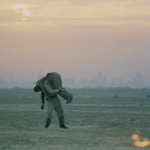 I’ve spent a good portion of the last two weeks thinking, reading, writing and debating about Clint Eastwood’s AMERICAN SNIPER. It’s an interesting movie that has spurred alot of debate from different points-of-view. But the important perspective that isn’t in the movie or in the conversation as far as I’ve been able to see is that of the Iraqi people. Clint followed his WWII movie FLAGS OF OUR FATHERS with the way better companion piece LETTERS FROM IWO JIMA, from the perspective of doomed Japanese soldiers. I wish he could do that for the Iraq War too.
I’ve spent a good portion of the last two weeks thinking, reading, writing and debating about Clint Eastwood’s AMERICAN SNIPER. It’s an interesting movie that has spurred alot of debate from different points-of-view. But the important perspective that isn’t in the movie or in the conversation as far as I’ve been able to see is that of the Iraqi people. Clint followed his WWII movie FLAGS OF OUR FATHERS with the way better companion piece LETTERS FROM IWO JIMA, from the perspective of doomed Japanese soldiers. I wish he could do that for the Iraq War too.
It’s too bad, I thought, that there’s not much of a film industry in Iraq, because that would be a great way for us to see the war and its effects through their eyes. Well, it turns out that a couple such movies do exist. One of them is AHLAAM (2004), based on a true story about the people in a psychiatric hospital in Baghdad during the 2003 “shock and awe” bombing a few days before the fall of Saddam Hussein.
Their stories jump back earlier, to 1998. We watch some young soldiers, Ali will become a patient at the hospital and Mehdi will become a doctor there. Mehdi works hard to study medicine and prepare for his exams, with lots of support from his old mother, who makes him tea and hovers over him while he studies. He passes, but he has trouble getting into the school he wants to, we learn, because his deceased father was a communist. A portrait of him hangs in their home, watching over mom but looming over Mehdi, a liability he can never escape.
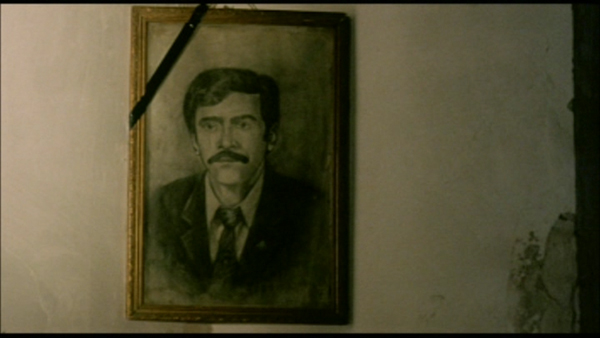
We also meet Ahlaam, who is madly in love with Ahmed, a suave young-Alfred-Molina type with slicked back hair and mustache. They skip rocks together and stuff, they’re crazy about each other. Then at their wedding a bunch of dudes with guns show up and drag him away. I guess it’s the cops coming after him for protesting Saddam.
So in the hospital Ahlaam is still wearing her wedding gown, crying for Ahmed, hallucinating him, confusing other people for him. This gets her into alot of trouble.
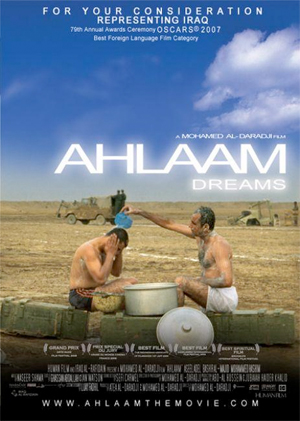 To me the most interesting backstory is Ali, who joins the army with his friend Hasan. Hasan is really troubled, and he always blames it on a condition he has that causes white spots in his hair. The army won’t help him get treatment for it and he doesn’t think he fits in. And more importantly, I would think, he doesn’t want to fight for Saddam or the Baathists. He talks about fleeing to Syria. Ali convinces him that they’re not fighting for the Baathists, they’re fighting for their country, and he should stay.
To me the most interesting backstory is Ali, who joins the army with his friend Hasan. Hasan is really troubled, and he always blames it on a condition he has that causes white spots in his hair. The army won’t help him get treatment for it and he doesn’t think he fits in. And more importantly, I would think, he doesn’t want to fight for Saddam or the Baathists. He talks about fleeing to Syria. Ali convinces him that they’re not fighting for the Baathists, they’re fighting for their country, and he should stay.
Then poor Hasan gets blown up. Ali tries to get him help. He puts him over his shoulders and hauls him across rugged land all day. When he finally finds some other people it’s near the border and for reasons I wasn’t really clear on he’s accused of trying to desert. As punishment they severe one of his ears – actual doctors do it, and convince themselves it’s part of their job – and confine him to the psychiatric hospital. He seems to spend his days saying “Hasan is here, he’s here. Hasan is here with me.” He’s demented by guilt.
There’s a dramatic moment where Ahlaam is about to get electroshock, and then the bombs drop. She’s strapped to this chair but suddenly she has a vision of a white heavenly place where, you guessed it, Ahmed is with her. Then all the sudden she realizes she’s in the bombed out hospital.
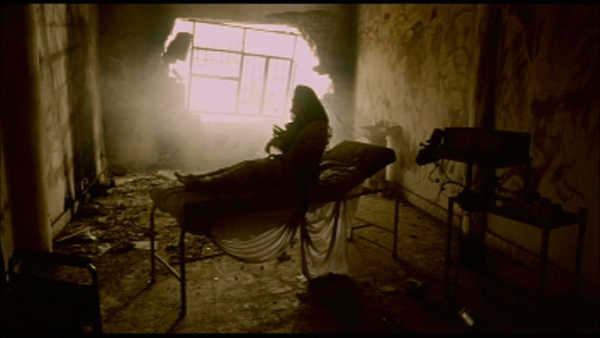
The second half of the movie is about how the walls are knocked down and the patients all get loose. They’re wandering around Baghdad which is partly deserted but partly plagued by looters, things on fire, etc. Mehdi needs to round up the patients for their own safety, and knowing that Ali was a soldier like he was he enlists his help. Having a task that could redeem him for not being able to rescue Hasan, Ali snaps out of it and takes the mission very seriously. He’s running around with no shirt on finding the patients until a nice old man under a bridge decides to give him a trenchcoat.
I wish Ahlaam was as interesting as Mehdi and Ali. She’s kind of a helpless victim in all this. She doesn’t get a chance to get her shit together. She’s forever in turmoil. Her name means “dreams,” so I hope she’s not a symbol for the hopes and dreams of her country.
I wasn’t sure what to expect quality-wise from an Iraqi feature. It’s definitely not slick but it’s not amateurish in any of the ways I was afraid it might be. If anything it has the feel of American indie movies from the pre-Tarantino ’80s and ’90s, movies budgeted by maxing out credit cards, using non-actors, real locations and cheap film stock. What’s amazing about it is seeing the actual people and places of Baghdad. A school, a market, a wedding.
It’s a very different culture we see, it’s not a “they’re just like us” situation, but they’re very relatable. They don’t have much but they share alot, making big meals and inviting people over. Some of them are more aware and noble than others. Some of them are goofballs, even. They’re just people chasing their dreams, like anywhere. You hate to think of Bradley Cooper watching them through crosshairs and trying to decide if they’re up to something.
The DVD transfer is kinda shitty, but the imagery is still pretty amazing. Obviously they had to stage the chaos and set things on fire, but you figure some of the rubble must be real. After so many digitally yellow-tinted films in Morocco and South Africa and stuff standing in for Iraq it’s pretty cool to see the real deal. Of course there’s lots of dirt and damage and mayhem that must’ve been kinda dangerous to stage and film:
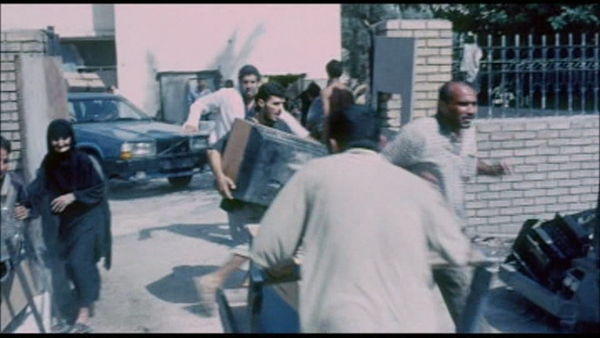
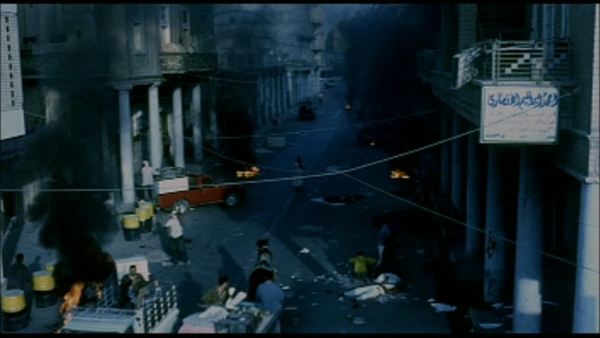
But also there’s just plain old beauty:
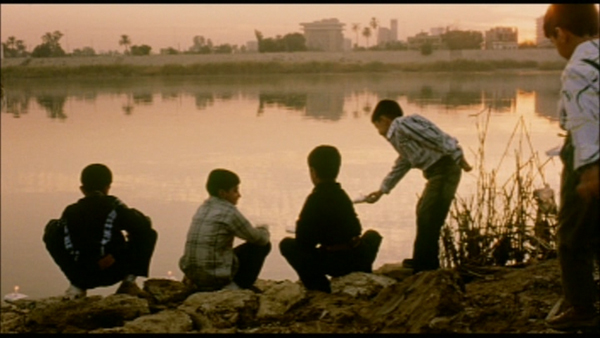
That’s kids lighting candles and floating them in the river before Ahlaam and Ahmed’s wedding. Unfortunately this is not the kind of imagery we think of when we think of Iraq, is it? Did I even know there was water in Iraq?
Because of the point in the war that this takes place the military is mostly at a distance. There is a sniper in the movie, but not an American one. Some Saddam loyalist or somebody, I’m not sure, but he’s on the roof taking potshots. Eventually the Americans show up with helicopters. The climactic confrontation is between American soldiers and Ahlaam’s parents. They’re trying to explain that their daughter is in this building and she’s mentally ill, they need to help her, but the soldiers don’t understand or trust them and shove them to the ground. It might as well be Radio Raheem and the NYPD. They’re face-to-face but they’re not connecting as fellow humans.
The part with the Americans is kinda funny because you can tell they didn’t have any white guys to play them. They mostly don’t show their faces, and the one guy you do see clearly doesn’t look American and is clearly dubbed as he yells “Get out of here!” They also don’t seem to move like trained soldiers. But oh well.
One thing never mentioned in the movie: 9-11. Because obviously to them this has nothing to do with 9-11. Their state news reports do continue to update on the UN inspectors looking for weapons of mass destruction. They accuse the inspectors of spying for the CIA, of being puppets of the U.S. and U.K. Some of this might be true, I don’t know, but since they always refer to the head inspector as “the mercenary Richard Butler” they seem pretty biased.
And what do you know, like AMERICAN SNIPER this is a movie that doesn’t tell you what to think about the war. During the climax the American soldiers, out of fear of insurgents, are treating Ahlaam’s parents degradingly, and her father curses them for coming to Iraq. On the other hand, nobody in the movie was happy about the way things were before, and all of these people (including the man trying to save Ahlaam) ended up in the psychiatric hospital as a result of their victimization by the regime. I suppose that may be the symbolism right there: they were driven crazy by the country as it was, but once the Americans took apart the hospital/government it endangered them in new ways.
I think the point is, both for these characters and for the American soldiers in the other movie, the choice to go to war or not has nothing to do with them. It’s just a reality they have to deal with.
Hey, I wonder if Iraqis argued about how close this was to the true story? Does it matter?
This was filmed on location in actual Baghdad in 2004, while the war was still going on. Reportedly director Mohamed Al-Daradji and three crew members were kidnapped and almost shot by insurgents, who thought they were making propaganda in support of the new government. Then the same day they escaped they say there were kidnapped by another bunch of guys with guns before being dumped off with the U.S. military, who locked them up for six days thinking they were making propaganda for Al Qaida.
I guess Clint wasn’t that misunderstood on AMERICAN SNIPER.
Al-Daradji was born in Baghdad, but when he was a teenager he fled to The Netherlands. He went to film school in England and directed short films and commercials before making his feature debut with AHLAAM. He’s done a few more since then, including a pretty acclaimed one called SON OF BABYLON in 2009. He’s stayed in Baghdad, trying to get an Iraqi film industry going.
I really believe that’s crucial, that it could make a huge difference in international relations. All the warriors with guns assumed that these artists with cameras were making propaganda. The truth is they were making the antidote to propaganda. A movie like this, without even being more than pretty good, reminds me of the real power of cinema. Even as a person who always opposed the war and didn’t want to see the Iraqi people treated as collateral damage and potential enemies it was pretty eye-opening to watch this movie and simply see some of the actual people in the actual places. You don’t just see the old ladies crying about a bomb going off, you also see them chopping the onions for the rice.
They’re just families, neighborhoods, friends, dudes. They care about each other, they annoy each other, they joke, they give each other shit, they tell stories. They have worries and doubts and have to make compromises just like we do. They don’t deserve to get caught up in all this. And the more movies we have coming from different parts of the world, the more voices that can be heard, the more we all can be reminded of each other’s humanity.
If we are willing to read subtitles.
Ah, shit.


























February 3rd, 2015 at 2:31 pm
Wonderful, Vern.
Here’s a very unusual thought: I think it’s sobering to consider that, if this exact story played out in an American cultural context, people would consider these situations as fantastical ones that would never occur in their real society. Consider any post-apocalyptic fantasy where American society is constantly at war, run by a gang of corrupt gangsters. Yet there are cultures in this world for whom these fantastical situation are completely real. The situation of a husband being dragged away from a wedding party, to be tortured and executed for criticizing the President would be completely conceivable to them. To Americans, a bomb detonating in a big city and ripping dozens of people to shreds would not be a national tragedy that is remembered for years and commemorated in poetry and memorials — it would be a monthly or even weekly occurrence, something that you have to shrug off to retain your sanity.
For these reasons, films such as AHLAAM show us how truly apart we are as societies, and that we shouldn’t take our Western comforts for granted. Iraq has film crews too, and they’re trying to express themselves in an artistic medium that we, as readers of this site, all love. In this aspect, Iraqis and Americans are really not so different, and that is an inspiring thought indeed. Art provides one of the greatest and most valuable ways with which to criticize the Status Quo — whether this critique is directed at individual tyrants (see: THE GREAT DICTATOR, SCHINDLER’s LIST, and arguably, COMMANDO), or one of the many possible ways in which society may be dysfunctional (MISSISSIPPI BURNING, DELIVERANCE, and arguably, ON DEADLY GROUND).
Any society that does not safeguard the freedom to criticize their authority figures can quickly fall back into totalitarianism. For many Iraqis, then as now, genuine public criticism of the governing forces, or religious fundamentalists, would be a gruesome way to commit suicide. So let us ask ourselves. Are we, in Western countries, also able to criticize all authority unconditionally? Us Westerners should not become too complacent, in light of blasphemy laws (I’m looking at you, European Union) and people jailed or murdered for criticizing authority (Turkey, Russia, Hungary, the list goes on). People are already being murdered on the streets of Europe for offending religious authority.
I believe that, on this site, we agree that we must preserve our right to express our opinions freely. If we honor the way that the filmmakers behind AHLAAM appear to have risked their lives to participate in the enterprise of film, we will have done much to advance the cause of cultural understanding and Vern’s sadly forgotten PEACE INITIATIVE.
Peace out.